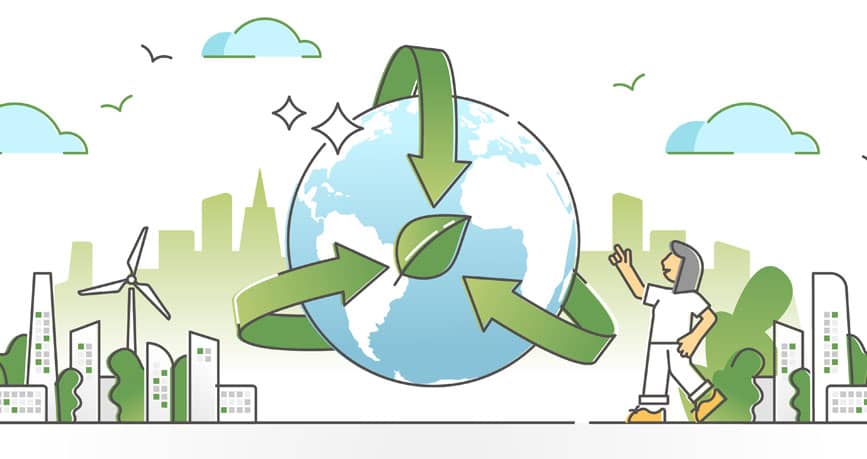 Add My Company
Add My Company

Well-led now includes a focus on how you are mitigating any negative impact your service has on environmental issues. As part of CQC’s new Single Assessment Framework there is now a quality statement on environmental sustainability and inspectors and assessors will be looking at how providers of health and social care services have made efforts to become more environmentally sustainable. This quality statement links to Regulation 17 Good Governance.
Quality Statement:
We understand any negative impact of our activities on the environment and we strive to make a positive contribution in reducing it and support people to do the same.
What does it mean in practice and what can you be considering?
CQC will want to see that across your organisation, everyone understands that climate change is a significant threat to the health of people who use services, their staff, and the wider population. CQC will now look at how you are mitigating against any negative impact your service has on environmental issues and will look at how you are making a positive contribution to reducing the impact on the environment.
There are lots of small practical steps that you can take, such as recycling, but in order to embrace this in the way the CQC will be focusing, you need to take active steps towards ensuring the principles of net zero care are embedded in planning and delivery of care.
ESG: Environment, Social, Governance.
You might want to start by breaking this down into 3 sections often used by many industries: ESG: Environment, Social and Governance.
ESG is a collective term for a business’s impact on the environment and society as well as how robust and transparent its governance is in terms of company leadership, audits, internal processes and staff rights.
Lets’ look at each section and consider those practical steps you can take.
Environmental
The environmental aspect focuses on how the business minimises its impact on the environment. It covers the business’s products/services, how you operate and who you purchase from, and companies you work with.
Examples of environmental business practices include:
- Switching to zero-waste products or sustainable packaging using biodegradable materials
- Encouraging recycling and reducing the amount of waste destined for landfill.
- Introduce a battery recycling bin for staff and people who use services.
- Using microfilters for washing machines, filters out the micro plastic getting into environment.
- Changing lighting to greener standards (switch off when no one is in the room)
- Solar panels
- Green hours calls, home based care, could you offer reduce rates for visits that are later in the morning, when there is less traffic, staff member takes less time to travel,
- Assess your own carbon footprint. WWF have a carbon footprint calculator: https://footprint.wwf.org.uk
Note: In a bid to minimize waste and move towards a sustainable economy, a series of waste reduction targets have been set for England. By 2025, at least 55 percent of municipal waste must be recycled, with the target increasing to 65 percent by 2035.
Lots of information: https://businessofrecycling.wrap.org.uk/calculator
Social
The social aspect focuses on how a business impacts wider society and workplace culture. Organisations can positively contribute to fairness in society, investing in fair and equal opportunities and conditions for employees, people working in the supply chain, and local communities. Equality and fairness are at the heart of this aspect, having a real focus on social and ethical business practices.
Examples of social business practices include:
- Ensuring products are safe and customer data is secure.
- Making sure your recruitment practices uphold safe and fair recruitment.
- Taking an ethical and moral responsibility when recruiting people from overseas
- Making sure you have policies and procedures in place such as Modern Slavery and Human Trafficking
- Providing training and supporting health and safety, and wellbeing
- Promoting equality in the workforce with diversity and inclusivity policies
- Investing in local community projects, such as funding educational initiatives.
- Can you take surplus food to a food bank.
Governance
Governance refers to the processes of decision-making, reporting, and the compliance processes of running a business. Governance is linked to the environmental and social aspects of ESG in that it looks at the ethical and moral responsibilities you have as a business and to the staff, the people you support and the community.
Examples of governance practices include:
- Develop your own environmental sustainability plan.
- Business leaders and managers taking a responsibility to holistically risk assess the business including the environment, staff practice, care practice and engagement with the wider community and other businesses.
- Staff and leaders empower their staff to understand sustainable healthcare and how to reduce the environmental impact of healthcare activity.
- Leaders and managers engage with suppliers and customers to find out about their carbon footprint and use those companies that have carbon footprint statements.
- Engage with the local authorities’ carbon footprint plan.
- Engage your team, engage the people you support, make sure you have a policy, share your progress.
- Audit your environmental sustainability plan! How are you progressing your plan? Look for little changes that you can measure, such as recycling, food waste.
We are already 6 months into the Single Assessment Framework, this quality statement may not be assessed until 2025 but NOW is the time to start planning what you are doing and preparing the evidence.
- Do you have an environmental sustainability policy?
- Have you consulted with staff and people who use your services?
- Have you developed an Action Plan?
- How are you auditing and monitoring this progress?
Think about your evidence!
- https://www.british-business-bank.co.uk/business-guidance/guidance-articles/sustainability/what-is-esg-a-guide-for-smaller-businesses
- https://www.cqc.org.uk/guidance-regulation/providers/assessment/single-assessment-framework/well-led/environmental-sustainability
Additional Legislation:
Environment Act 2021
Climate Change Act 2008
Health and Care Act 2022
W&P have a long history of supporting social care businesses. If you have any questions about your business’s environmental sustainability or, require our Sustainability Policy, available for Care Homes, Supported Living and Domiciliary services, please contact us.
For more information on Sustainability – what does it mean for care services and CQC Compliance? talk to W&P Assessment and Training Centre


